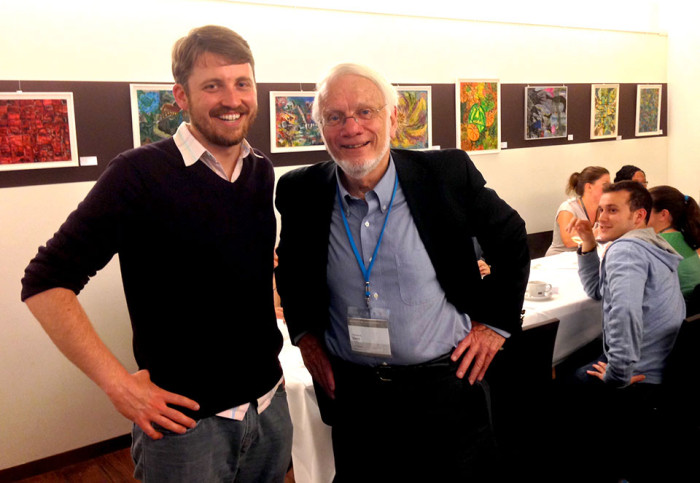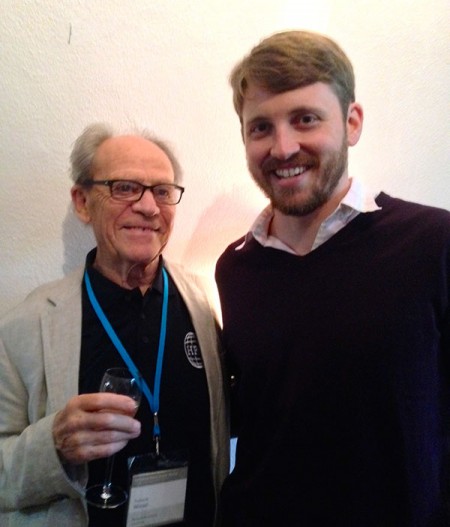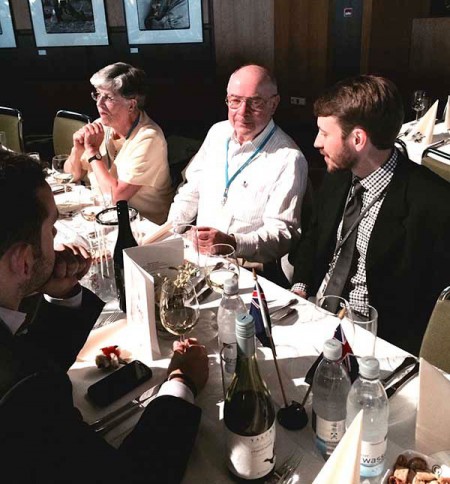Jordan McCall
Doctoral candidate Jordan McCall networked with Nobel laureates at an annual meeting of students and researchers in Lindau, Germany. McCall is ready to do his part to move science forward

Jordan McCall stops for a photo with Nobel Prize laureate <a href="http://www.nobelprize.org/nobel_prizes/chemistry/laureates/2009/steitz-facts.html">Thomas A. Steitz, PhD</a>, who in 2009 received the Nobel Prize in chemistry along with scientists Venkatraman Ramakrishnan, PhD, and Ada E. Yonath, PhD, for studies of the structure and function of the ribosome.
Not many young scientists get a chance to hobnob with Nobel laureates.
So Jordan McCall was elated last year to learn that he had been chosen to attend the Lindau Nobel Laureate Meeting – an annual gathering of Nobel laureates and young students and researchers. McCall, who will defend his dissertation for a PhD in neuroscience this spring, was one of 19 Americans selected to attend the meeting, which is held in the picturesque island city of Lindau, Germany.
The event stands out as a major milestone in his time as a student in Washington University’s Division of Biology and Biomedical Sciences. It allowed him to listen to talks from some of the world’s greatest contributors to the fields of chemistry, physics and medicine. Even better, it allowed him and other young researchers to participate in breakout sessions, eat dinner, and sit and chat with Nobel laureates.

“Because the island of Lindau is quite small, it was fairly common to run into a laureate about town,” McCall recalled. “My personal favorite encounter of that sort was with Thorsten Wiesel, MD, a neuroscientist whose work is taught in neuroscience courses throughout the world. My roommate from the conference and I just saw him at a bar and approached him. He was very happy to meet young neuroscientists who are keeping the field moving forward while still remembering him.”
McCall left Lindau having soaked up laureates’ talks about their research, overviews of their fields and some of the major issues affecting science.
“Two topics that received a great deal of attention were open-access publishing and the funding of basic vs. clinical research,” McCall said. “Obviously, everyone supports the notion of science to benefit mankind, but there was a strong push from most of the laureates to support basic science research, and many pointed to the many breakthroughs in basic science that have profoundly impacted human health.
“At its core, the Lindau Meeting was incredibly inspiring,” McCall continued. “Not only was there a very a powerful ‘top-down’ motivation from the laureates, there was a very raw energy amongst the young scientists to project how the biomedical sciences will evolve over our careers and what crucial questions we need to answer to move our understanding forward.”

In doing his part to move science forward, McCall plans to spend the next phase of his career working with Robert W. Gereau IV, PhD, the Dr. Seymour and Rose T Brown Professor of Anesthesiology at the School of Medicine and director of the Washington University Pain Center. McCall will study neural circuitry underlying the central processing of pain. His long-term goal is to direct his own laboratory focused on dissecting the neural circuitry that underlies complex behaviors, or to perhaps share a lab with his wife, Ream Al-Hasani, PhD, a research associate in anesthesiology and a recent recipient of a National Institutes of Health (NIH) Pathway to Independence award.
“My experience at WashU has far exceeded any of my possible expectations for grad school,” McCall said. “My adviser, Michael Bruchas, has actively supported so many projects of mine and has connected me with the broader scientific community. I just made a map of scientists with whom I have collaborated, and it includes people from 33 different institutions in five countries and 15 states, which, to me, demonstrates the team spirit that 21st century science requires.”
In addition to the map, McCall now has an impressive collection of selfies with laureates — his very own set of Nobel prizes.







